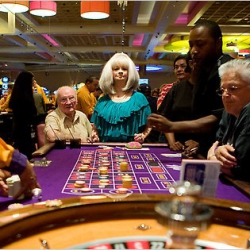A new report by Econsuit shows that Pennsylvania limits on casino spending are particularly strict in comparison to other U.S. states. Among the states, only Mississippi has spending limit regulations which are as rigid as Pennsylvania’s.
$2,500 Limit on Casino ATM Charges
For instance, Pennsylvania gaming law prohibits casinos from allowing credit card cash advances through ATM machines on the gaming floor. Pennsylvania casinos also have strict laws on the size of personal checks that can be accepted by casinos. In either case, $2,500 is the maximum limit on the size of a cash advance or cashed check at the casino.
In reviewing the statistics, Econsuit wrote that the result of these laws were the “risk of robbery or other criminal activity to the player” to a person playing cash was greater. The May report also stated that the laws tend to deter the “high profile player” from gambling in Pennsylvania casinos. When the report says “high profile”, it means “high roller”.
Limited Appeal to High Rollers
The upshot of the Econsuit report is that the laws limit the potential growth of the land-based gaming industry in the state. These days, the catchphrase is “high roller”, because more mass market gamblers are staying at home or limiting their play. Around the globe, Asian high rollers are the people casino operators want to lure.
Meanwhile, a casino stream of information in multiple states–including Pennsylvania–shows that slot machine revenues are down this year. Slots players seem to be staying away a bit more than in previous years. Traditionally, slots make up 60% to 70% of the revenues of a casino. Slots are the game of choice of mass market players. But if the revenues for gaming machines decline, then something has to replace them.
Missouri Allows Casino Markers
Lawmakers in Missouri passed a law earlier this summer passed a law which will allow gamblers to qualify for markers (loans) from the casino if they meet a $10,000 standard for gaming credit. Casinos will have no upper limit on the amounts of markers they can offer. Missouri’s casino owners had told the politicians they needed these more liberal gambling laws to lure more high-dollar players to the state, so the new law goes into effect on August 28. Markers are a luxury more associated with Las Vegas casinos than gambling halls in the Midwest, so Missouri casinos believe it will give them an edge over nearby competitors.
As mentioned earlier, Mississippi is the lone state in the country with max limits as low as Pennsylvania. It might not be a coincidence that Mississippi’s gambling industry is facing troubles. Earlier this year, Harrah’s Grand Tunica casino closed its doors, after revenues had fallen by nearly 50%. Some believe Harrah’s (owned by the debt-ridden Caesars Entertainment) won’t be the only Tunica County casino to fail.
Downside to High Stakes Gambling
Of course, if Pennsylvania passed a law similar to the one taking effect in Missouri on August 28, then the gamblers of the state could face dangers of their own. The Econsuit study pointed out the danger of carrying wads of cash around in one’s pockets. Limitations on spending prevent dangers, though.
When gamblers are allowed to easily access cash in a casino, it makes it a great deal easier for problem gambling to occur. The Missouri law is going to require casino management to practice self-restraint and good judgment when deciding who they offer big credit lines to. Of course, the credit reporting agencies will help with that to a certain degree, but a point will come when a judgment call has to be made.
Horror Story with High-Dollar Betting
In Australia last year, a high profile case happened where an Aussie casino offered a line of credit up to $70,000 to a man. It turned out the man was going to be forced to sell his home to pay the debt. Then it was learned that the man had an IQ that was below the level considered competent to give consent for such things. This led to a black eye for the Australian casino gambling industry, especially when the casino took the man to court and insisted he pay his debts. Such stories can become lightning rods for anti-gambling groups–and with good reason.
Econsuit’s report said it wasn’t sure why Pennsylvania set such strict limitations. One theory put forward suggested the need to protect gamblers. Another was an inability or unwillingness to regulate big money amounts. The first suggestion seems more realistic. Therefore, if Pennsylvania’s lawmakers and gaming leaders want to change the rules, they’ll have to consider whether they want to protect at-risk gamblers and their families, or lure more high rollers to the state.

